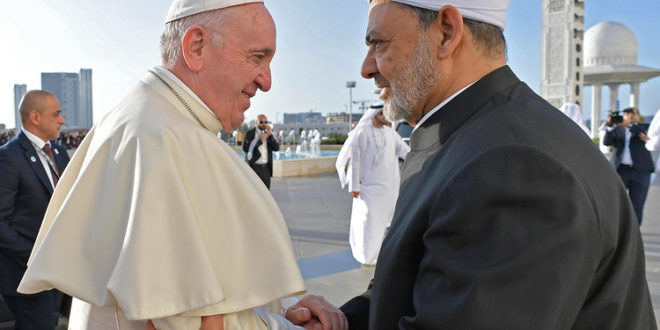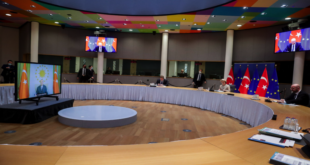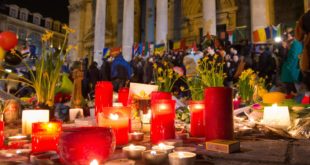Two leaders promise to work strenuously to spread the culture of tolerance and bring an end to wars, conflicts
During his visit to the United Arab Emirates Pope Francis and Sheik Ahmad el-Tayeb, the Grand Imam of al-Azhar and chair of the Muslim Council of Elders signed “A Document on Human Fraternity for World Peace and Living Together.”
The two leaders issued a strong condemnation on Feb. 4th against terrorism and violence: “God does not want his name to be used to terrorize people.”
Muslims and Catholics “of the East and West,” it said, “declare the adoption of a culture of dialogue as the path; mutual cooperation as the code of conduct; reciprocal understanding as the method and standard.”
“We, who believe in God and in the final meeting with him and his judgment, on the basis of our religious and moral responsibility, and through this document, call upon ourselves, upon the leaders of the world as well as the architects of international policy and world economy, to work strenuously to spread the culture of tolerance and of living together in peace; to intervene at the earliest opportunity to stop the shedding of innocent blood and bring an end to wars, conflicts, environmental decay and the moral and cultural decline that the world is presently experiencing.”
The document is seen as a milestone in relations between Christianity and Islam. It also represents a message with a strong impact on the international scene.
In the preface, after affirming that “Faith leads a believer to see in the other a brother or sister to be supported and loved,” the text is spoken of as a text “that has been given honest and serious thought,” which invites “all persons who have faith in God and faith in human fraternity to unite and work together.”
The document opens with a series of invocations: the Pope and the Grand Imam speak “in the name of God who has created all human beings equal in rights, duties and dignity,” “in the name of innocent human life that God has forbidden to kill,” “in the name of the poor,” “orphans, widows, refugees, exiles … and all victims of wars” and “persecution.”
Al-Azhar, together with the Catholic Church, “declare the adoption of a culture of dialogue as the path; mutual cooperation as the code of conduct; reciprocal understanding as the method and standard.”
For the full text of the Document on Human Fraternity for world peace and living together, click here.
 ForMENA Council for MENA affairs
ForMENA Council for MENA affairs



